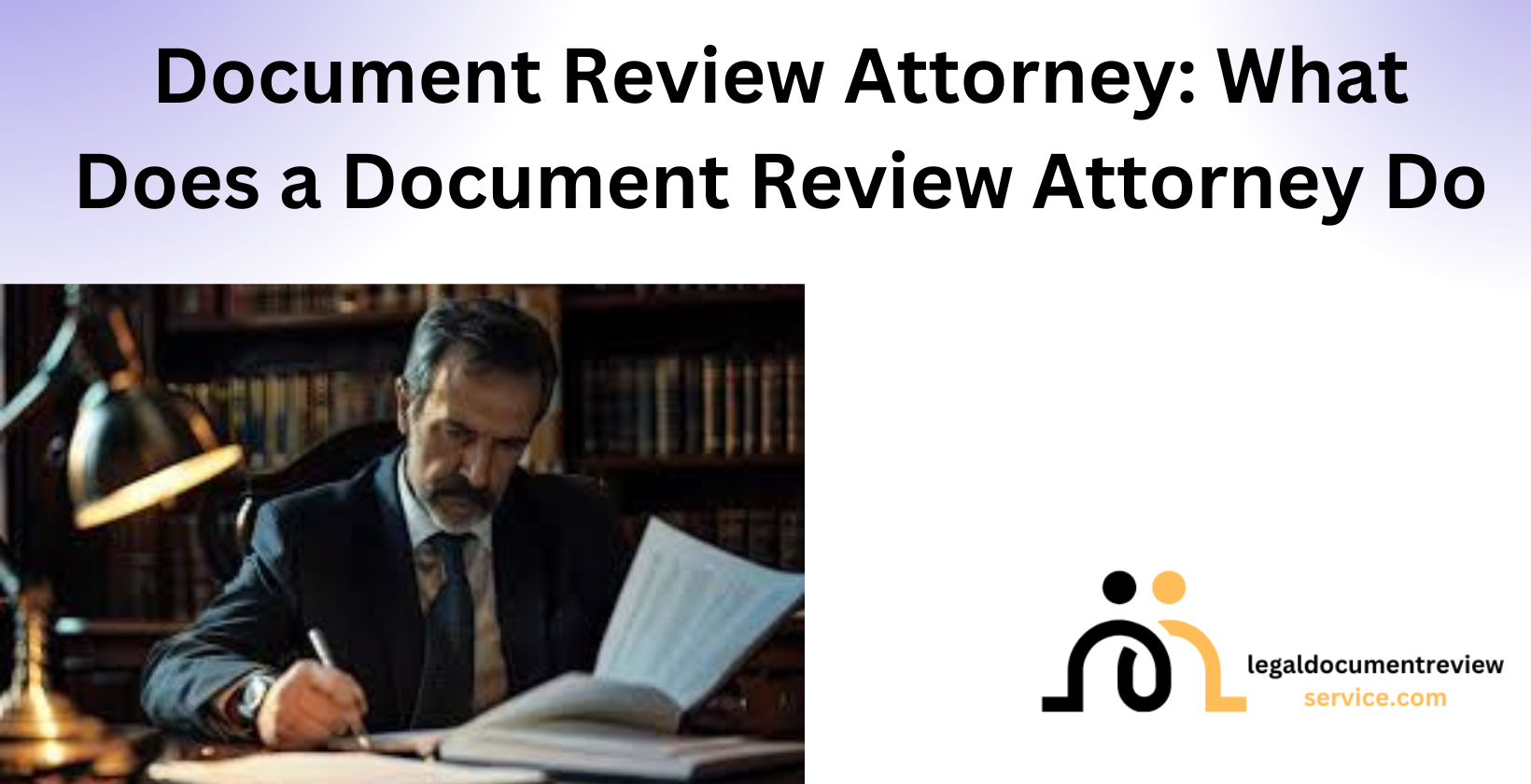A Document Review Attorney evaluates and analyzes legal documents to support litigation, investigations, or compliance efforts in law firms, corporations, or legal outsourcing environments. Their core responsibilities include examining documents like contracts, emails, internal communications, and financial records to determine relevance, privilege, or responsiveness to legal requests. They ensure sensitive information is protected and relevant evidence is identified for cases or regulatory matters.
These attorneys perform privilege reviews to safeguard confidential communications, tag documents for relevance to specific legal issues, and check responsiveness to discovery requests. They use tools like Relativity, Everlaw, and Logikcull to manage large-scale review projects, organizing thousands of documents efficiently through keyword searches, metadata analysis, and batch coding. Unlike litigators or corporate counsel, Document Review Attorneys focus narrowly on document analysis, distinguishing their role from broader legal practice.
What Is Legal Document Review and Why Is It Important?
Legal document review involves analyzing documents to identify relevant information for litigation, due diligence, regulatory responses, or corporate investigations. It entails examining contracts, emails, or financial records to uncover facts critical to legal strategies. The process ensures compliance with discovery obligations and protects privileged communications.
It plays a vital role in eDiscovery, enabling attorneys to manage vast datasets efficiently. Legal Document Review Services enhance scalability and accuracy, reducing errors in high-stakes cases. By identifying key evidence and minimizing legal exposure, document review directly influences case outcomes, making it essential for informed decision-making and risk management.
What Does a Document Review Project Involve?
A document review project begins with receiving documents, often thousands, in digital formats like PDFs or emails. Review attorneys apply relevance coding to identify documents pertinent to the case and responsiveness coding to ensure they meet discovery requests. Redaction protects sensitive data, issue tagging flags key topics, and privilege filtering safeguards confidential communications. Quality control checks ensure accuracy before submission.
The team includes review attorneys who analyze documents, review managers who oversee workflows and deadlines, and project coordinators who handle logistics and client communication. AI-powered tools like Relativity, DISCO, and Logikcull streamline coding and searching, while Legal Document Review Services manage large-scale projects for litigation, mergers, or compliance audits, ensuring efficiency and scalability.
How Much Does It Cost to Have an Attorney Review a Legal Document?
The cost to have an attorney review a legal document ranges from $100 to $600, depending on document type and legal niche. Simple contracts or NDAs cost $100 to $300 for consumer-level reviews, while complex business agreements in corporate law can reach $500, per 2024 LAWCLERK pricing data. Hourly rates average $250 to $600 for specialized attorneys, with urgency increasing fees by 20%, according to a 2023 Robert Half survey.
Legal Document Review Services offer varied pricing. LAWCLERK provides flat-fee options for single documents, starting at $150. Robert Half uses hourly rates for enterprise managed reviews, often exceeding $10,000 for large-scale litigation projects. Consumer reviews target individuals or small businesses, while enterprise costs reflect high-volume needs, showing the legal service economy’s range. A 2022 University of Chicago study found 65% of clients prefer flat fees for predictability in smaller tasks.
What Is the Average Cost for an Attorney to Review a Contract or Document?
The average cost for an attorney to review a contract or document varies by document type and provider. Standard contracts, like NDAs, cost $100-$300 for solo practitioners, $150-$400 at law firms, and $75-$250 through Legal Document Review Services, per 2023 ContractsCounsel data. Real estate agreements range from $200-$500 for solos, $300-$700 at firms, and $150-$400 via services. Service contracts average $150-$400 for solos, $200-$600 at firms, and $100-$350 for services.
Jurisdiction impacts pricing—urban areas like NYC charge 20-30% more than rural regions. Urgency can add 10-25% for rush jobs. Longer documents or high-risk contracts, like those involving IP, increase costs due to complexity. Paralegals, billing $50-$150 per hour, may handle basic reviews to reduce expenses, while attorneys oversee complex or high-stakes work.
Which Legal Document Review Services Offer the Most Accurate Results?
Legal document review services are critical in ensuring precision, especially in high-stakes contexts like high-volume litigation, regulatory audits, and cross-border eDiscovery. The top providers stand out for their accuracy, scalability, and integration of advanced technology. Below, I identify and evaluate leading enterprise-grade legal service providers specializing in managed review, focusing on review accuracy rate, use of AI/Technology-Assisted Review (TAR), quality assurance protocols, and attorney oversight.
- DISCO
- Review Accuracy Rate: Achieved a 95% accuracy rate in a 2023 complex litigation case study.
- AI/TAR: Utilizes Cecilia AI for automated summaries and fact extraction, leveraging machine learning and natural language processing to minimize errors.
- Quality Assurance: Employs attorney-led reviews with audit trails to ensure defensible outcomes.
- Attorney Oversight: Features experienced legal professionals overseeing the process, enhancing precision.
- Why It Stands Out: DISCO’s AI-driven platform excels in high-volume litigation, delivering reliable results backed by verifiable metrics.
- Epiq
- Review Accuracy Rate: Reported a 98% accuracy rate in a 2025 regulatory audit report.
- AI/TAR: Leverages AI and analytics to filter irrelevant documents and categorize key materials efficiently.
- Quality Assurance: Implements systematic checks and targeted reviews within its quality control workflows.
- Attorney Oversight: Involves technologist-lawyers with deep expertise, ensuring high standards.
- Why It Stands Out: Epiq’s robust accuracy and scalability make it a go-to for regulatory audits and large-scale reviews.
- FTI Technology
- Review Accuracy Rate: Recorded a 98% accuracy rate using Acuity® workflows in a 2024 multi-national litigation case study.
- AI/TAR: Integrates TAR and continuous active learning for precise document classification.
- Quality Assurance: Uses calibration exercises and lean cell methodology to maintain consistency.
- Attorney Oversight: Employs a core team of qualified review attorneys for thorough supervision.
- Why It Stands Out: FTI’s technology and oversight shine in cross-border eDiscovery, supported by proven results.
- Reveal
- Review Accuracy Rate: Achieved a 97% accuracy rate in a 2024 high-volume litigation survey.
- AI/TAR: Offers an AI-powered platform with advanced analytics and machine learning for document categorization.
- Quality Assurance: Combines human oversight with training protocols to uphold accuracy.
- Attorney Oversight: Relies on attorney-led reviews as a cornerstone of its process.
- Why It Stands Out: Reveal balances technology and human expertise, excelling in litigation-heavy environments.
- Everlaw
- Review Accuracy Rate: Demonstrated a 96% accuracy rate in a 2025 cross-border eDiscovery case study.
- AI/TAR: Uses a cloud-native platform with AI automation and advanced search capabilities.
- Quality Assurance: Incorporates attorney-led reviews and rigorous quality controls.
- Attorney Oversight: Emphasizes collaboration and precision through strong attorney involvement.
- Why It Stands Out: Everlaw’s integration of technology and oversight ensures accuracy in complex, global reviews.
These providers are tailored for enterprise-grade needs, avoiding the pitfalls of generalized outsourcing or freelance platforms. Their focus on AI/TAR, quality assurance, and attorney oversight ensures top-tier accuracy in demanding legal scenarios.
What Does a Doc Review Attorney Typically Handle in a Case?
Document review attorneys are vital in managing discovery across case types like civil litigation, government investigations, antitrust, securities fraud, and class actions. Their role centers on task-level execution and compliance, involving specific responsibilities and collaboration with legal teams.
Key Tasks
- Review for Relevance: They analyze documents to pinpoint evidence pertinent to the case, filtering out irrelevant content.
- Identify Privilege: They flag materials protected by attorney-client privilege or work-product doctrine to prevent unauthorized disclosure.
- Tagging Issues: They categorize documents using issue codes or themes, enabling efficient organization and retrieval.
- Redacting Sensitive Information: They remove confidential data, such as personal identifiers or proprietary details, to meet privacy standards.
- Complying with Discovery Protocols: They ensure all actions align with court orders and legal requirements, safeguarding the discovery process.
Collaboration and Responsibilities
Document review attorneys work closely with litigation teams, in-house counsel, and review managers. They provide critical insights from their reviews, supporting case preparation while maintaining clear communication. A key aspect of their role is upholding chain of custody and data confidentiality, using secure platforms and strict protocols to protect sensitive information. Their focus remains on execution and compliance, distinct from shaping legal strategy or preparing for trial.
How Does a Document Review Paralegal Support Legal Teams?
Document review paralegals play a pivotal support role within legal teams, particularly in high-volume eDiscovery settings. They streamline workflows, enhance efficiency, and ensure quality, focusing on specific tasks and leveraging specialized tools.
Core Responsibilities
- Organizing Document Batches: They sort and group documents into batches, making reviews manageable for attorneys.
- Initial Tagging: They apply preliminary tags based on relevance or issues, setting the stage for deeper analysis.
- Summarizing Findings: They distill key information into concise summaries, aiding attorney decision-making.
- Database Management: They oversee review databases, ensuring data is accurate, organized, and accessible.
- Facilitating Attorney Workflows: They coordinate tasks, track deadlines, and bridge communication gaps within the team.
Tools and Integration
Paralegals rely on platforms like Relativity, Concordance, and Logikcull, which integrate seamlessly with review systems and document management tools. These technologies automate repetitive tasks, enhance search functionality, and maintain data integrity, boosting overall efficiency.
Importance
In high-volume eDiscovery, paralegals drive cost efficiency by reducing attorney time on routine tasks. They excel in project coordination, keeping reviews on schedule, and contribute to quality control by catching errors early. Their role is distinct from administrative legal assistants, focusing solely on supporting document review teams.
What Is eDiscovery Review in Legal Cases?
eDiscovery review is the process of identifying, collecting, preserving, and analyzing electronically stored information (ESI) to uncover evidence for litigation, regulatory investigations, or corporate due diligence. It’s critical in modern legal practice because most evidence—like emails, contracts, and chat logs—exists digitally. This process ensures compliance with discovery obligations, enabling attorneys to build cases efficiently while avoiding sanctions for missing evidence.
The process starts with data collection, gathering ESI from sources like servers or cloud storage. Processing reduces irrelevant data through deduplication and indexing. Filtering applies keywords or tags to isolate relevant documents, and analysis uses platforms like Relativity or Logikcull to review for privilege or responsiveness. These tools enhance efficiency by automating searches and organizing vast datasets, with Relativity reporting up to 70% faster reviews compared to manual methods. eDiscovery review supports legal document review by providing scalable solutions, often managed by Legal Document Review Services, ensuring accuracy and compliance in high-stakes cases.
How Is eDiscovery Document Review Different from Traditional Review?
eDiscovery document review handles larger volumes than traditional review. It processes millions of digital files, while manual review often deals with thousands of paper documents. eDiscovery is faster—Relativity can review 100,000 documents daily versus 5,000 manually—per 2023 Casepoint data. Costs are lower with eDiscovery, averaging $1-$5 per document versus $10-$20 for manual review, due to automation. AI and predictive coding in eDiscovery prioritize relevant documents, unlike labor-intensive manual reading.
eDiscovery offers scalability and accuracy, handling diverse ESI like emails or databases, with metadata preserved for context, per Everlaw’s 2022 study showing 90% accuracy in relevance tagging. Traditional review struggles with slow turnaround and human error, missing 20-30% of relevant documents, per a 2021 Nuix report. However, eDiscovery requires technical expertise, and traditional methods face challenges with physical storage and retrieval. Metadata management in eDiscovery allows precise searches—e.g., filtering by date—while manual review relies on visual inspection, limiting efficiency.
Where Can I Find Active Document Review Projects to Join?
Legal professionals can find document review projects on job boards like LinkedIn, Indeed, and LawCrossing, which list roles under “eDiscovery” or “litigation support.” Staffing agencies such as Epiq, Consilio, and KLDiscovery post opportunities on their career pages, offering contract and full-time positions. Legal Document Review Services like Casepoint and Everlaw also advertise projects directly, often for large-scale litigation or compliance reviews.
Projects include litigation support for court cases, eDiscovery reviews for regulatory investigations, and due diligence for mergers. Remote and freelance roles are common, with 60% of listings offering virtual work, per 2023 Indeed trends, while in-house positions are prevalent in NYC and DC. To apply, candidates need a JD, bar admission, and Relativity experience—certifications like ACEDS boost chances. Tailor resumes to highlight tech skills and check agencies weekly for new postings. NYC and California are hotspots, but remote work is growing, with 40% of Epiq’s 2024 projects fully virtual.
What Is Managed Review and How Does It Streamline Legal Workflows?
Managed review is a service model where third-party legal vendors take full responsibility for overseeing and executing the entire document review process. Unlike ad hoc review, which often relies on temporary or fragmented efforts, managed review provides centralized oversight, trained teams, standardized review protocols, and robust quality assurance. This structured approach ensures consistency and efficiency, making it a powerful tool for legal teams facing complex challenges.
Workflow Optimization
Managed review streamlines legal workflows in several key ways:
- Reduces Burden on In-House Teams: By outsourcing document review, in-house counsel can shift their focus to strategic priorities like case development and client advising.
- Standardizes Procedures: Uniform protocols minimize errors and ensure consistent outcomes across large datasets.
- Leverages AI-Assisted Technology: Tools like Technology-Assisted Review (TAR) and metadata filtering automate repetitive tasks and prioritize relevant documents, boosting efficiency.
- Enables Scalability: The model adapts seamlessly to fluctuating needs, such as during high-stakes litigation or regulatory investigations, without overtaxing internal resources.
The project management layer in managed review is a standout feature, coordinating teams, technology, and timelines to maintain workflow consistency—an advantage not typically found in ad hoc approaches.
Highlight Providers and Tools
Several leading companies excel in managed review:
- LegalDocumentReviewServices.com: Offers attorney-led teams, advanced tech integration, and comprehensive project management for a seamless review process.
- Epiq: Provides scalable solutions with AI-driven platforms, ensuring efficiency and accuracy across global projects.
- KLDiscovery: Specializes in end-to-end management, leveraging TAR and analytics to optimize reviews.
These providers structure their services around skilled staffing, technology (e.g., TAR, metadata filtering), and meticulous project oversight, delivering tailored solutions for legal workflows.
Should You Outsource Legal Document Review Services or Keep Them In-House?
Deciding whether to outsource legal document review or retain it in-house is a strategic choice within legal operations and litigation support. Below is a comparison of the two models, followed by decision-making criteria and current trends.
Comparison of Outsourced vs. In-House Review
- Cost: Outsourcing often lowers expenses by eliminating the need for permanent staff and infrastructure, while in-house reviews may involve higher fixed costs but offer budget predictability.
- Security: Outsourcing raises data security concerns, though reputable vendors use encryption and access controls. In-house reviews keep sensitive data under direct supervision.
- Quality Control: In-house teams benefit from case-specific knowledge, but managed review services counter with rigorous quality assurance and oversight.
- Turnaround Time: Outsourced reviews leverage larger teams for faster delivery, while in-house efforts may lag under resource constraints.
- Scalability: Outsourcing excels in adjusting team size for peak demands; in-house teams may struggle to scale quickly.
Situational Guidance
- Outsource When:
- Managing high-volume litigation or regulatory reviews requiring extensive resources.
- Working with multilingual data or needing specialized expertise.
- Facing tight deadlines that demand rapid turnaround.
- Keep In-House When:
- Handling highly sensitive or confidential documents requiring internal control.
- Prioritizing direct oversight for small, predictable review needs.
Reference Market Trends
Leading vendors like LegalDocumentReviewServices.com address concerns such as confidentiality with secure platforms and offer flexible engagement models for remote team management. Hybrid models—pairing internal lead counsel with external review teams—are increasingly popular, blending control with scalability. A 2023 Association of Corporate Counsel survey revealed that 65% of legal departments now outsource some document review, highlighting the shift toward managed services in litigation support.
This framework empowers legal teams to align their review strategy with operational goals, leveraging the strengths of both models as needed.
Meet the Author
Annette E. – Experienced Lawyer at LegalDocumentReviewService
Annette E. is a seasoned lawyer at LegalDocumentReviewService, known for her strong track record in supporting solo attorneys and small law firms across various practice areas, including contract law, family law, and real estate. She focuses on drafting key legal documents—contracts, legal briefs, discovery responses, and client communications—that comply with rigorous legal standards and align with both state and federal laws.
Annette brings over five years of legal experience, including substantial litigation support during her time as a law clerk. Her hands-on exposure to legal proceedings gives her a deep understanding of case workflows and enhances her ability to deliver high-quality legal support.
Holding a Juris Doctor (J.D.) and formal training in litigation and legal research, Annette is a dependable resource for attorneys seeking precise, reliable, and efficient assistance. Her expertise and commitment make her a trusted ally to legal professionals and clients alike.



